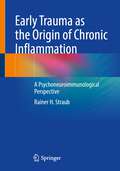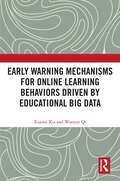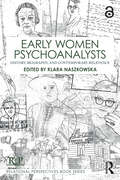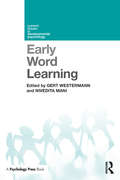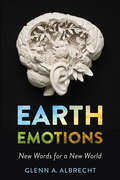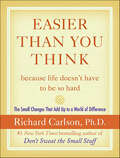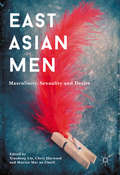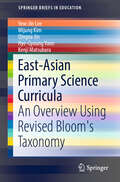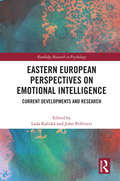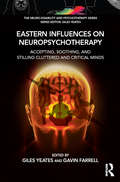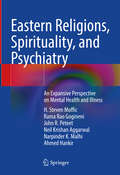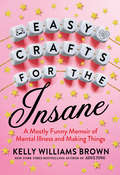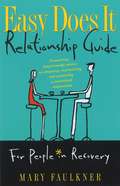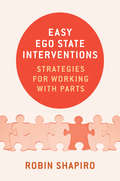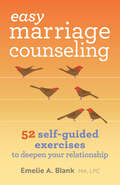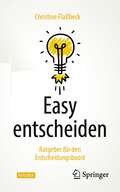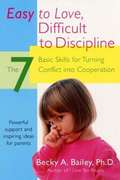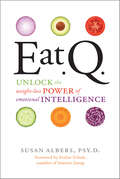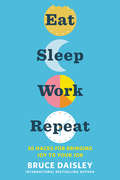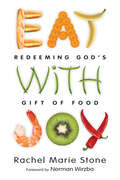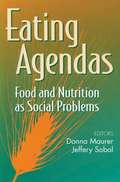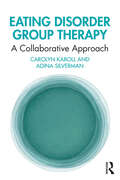- Table View
- List View
Early Trauma as the Origin of Chronic Inflammation: A Psychoneuroimmunological Perspective
by Rainer H. StraubThe aim of the book is to sensitize physicians and researchers to the important long-term health effects of early, persistent, and severe trauma. The author, an internist, rheumatologist, and basic researcher in psychoneuroimmunology, shows connections between adverse childhood experiences and typical adult sequelae. After early traumatic experiences and childhood stress, there is a higher incidence of mental illness, chronic pain, sleep disorders, dental problems, obesity, cardiovascular disease, asthma, diabetes mellitus and chronic inflammation. A selection of diseases unmistakably demonstrate the long-term consequences of early childhood trauma. These childhood experiences create a kind of long-term programming that has a negative effect in adulthood. From his psychoneuroimmunological perspective, Rainer Straub identifies four factors that link the brain to the immune system and are involved in chronic immune activation: direct connectors originating from the brain, indirect connectors functioning through hormonal and neuronal pathways, extracorporeal (the environmental factors) and pleiotropic connectors (genetic factors).
Early Warning Mechanisms for Online Learning Behaviors Driven by Educational Big Data
by Xiaona Xia Wanxue QiThe book aims to design and construct early warning mechanisms based on the dynamic temporal tracking technology for online learning behaviors, driven by educational big data.By studying a massive amount of learning behavior instances generated in various interactive learning environments worldwide, the book explores the continuous sequences of correlated learning behaviors and characteristics. From various angles, the authors have devised a series of early warning measures that could effectively solve multiple issues in learning behaviors driven by educational big data. Additionally, the book predicts patterns and identifies risks by analyzing the temporal sequences of the entire learning process. While presenting a range of theoretical achievements and technical solutions to improve and design new online learning mode, it also provides relevant technical ideas and methodologies for research on similar problems.The book will attract scholars and students working on learning analytics and educational big data worldwide.
Early Widow: A Journal of The First Year
by Mary Jane WordenThe journal of a young widow whose husband was killed by a drunk driver. Left alone with three children under the age of twelve, Mary Jane uses her faith in God to carry her through to healing.
Early Women Psychoanalysts: History, Biography, and Contemporary Relevance (ISSN)
by Klara NaszkowskaEach life story is unique, yet each also entwines with other stories, sharing recurring themes linked to issues of gender, Jewishness, women's education, politics, and migration.The book's first section discusses relatively known analysts such as Sabina Spielrein, Lou Andreas-Salomé, and Beata Rank, remembered largely as someone's wife, lover, or muse; and the second part sheds light on women such as Margarethe Hilferding, Tatiana Rosenthal, and Erzsébet Farkas, who took strong political stances. In the third section, the biographies of lesser-known analysts like Ludwika Karpińska-Woyczyńska, Nic Waal, Barbara Low, and Vilma Kovács are discussed in the context of their importance for the early Freudian movement; and in the final section, the lives of Eugenia Sokolnicka, Sophie Morgenstern, Alberta Szalita, and Olga Wermer are examined in relation to migration and exile, trauma, loss, and memory.With a clear focus upon the continued importance of these women for psychoanalytic theory and practice, as well as discussion that engages with pertinent issues such as gendered discrimination, inhumane immigration laws, and antisemitism, this book is an important reading for students, scholars, and practitioners of psychoanalysis, as well as those involved in gender and women's studies, and Jewish and Holocaust studies.
Early Word Learning (Current Issues in Developmental Psychology)
by Gert Westermann Nivedita ManiEarly Word Learning explores the processes leading to a young child learning words and their meanings. Word learning is here understood as the outcome of overlapping and interacting processes, starting with an infant’s learning of native speech sounds to segmenting proto-words from fluent speech, mapping individual words to meanings in the face of natural variability and uncertainty, and developing a structured mental lexicon. Experts in the field review the development of early lexical acquisition from empirical, computational and theoretical perspectives to examine the development of skilled word learning as the outcome of a process that begins even before birth and spans the first two years of life. Drawing on cutting-edge research in infant eye-tracking, neuroimaging techniques and computational modelling, this book surveys the field covering both established results and the most recent advances in word learning research. Featuring chapters from international experts whose research approaches the topic from these diverse perspectives using different methodologies, this book provides a comprehensive yet coherent and unified representation of early word learning. It will be invaluable for both undergraduate and postgraduate courses in early language development as well as being of interest to researchers interested in lexical development.
Earth And Reveries Of Will: An Essay On The Imagination Of Matter
by Gaston BachelardEarth and Reveries of Will An Essay on the Imagination of Matter
Earth Emotions: New Words for a New World
by Glenn A. AlbrechtAs climate change and development pressures overwhelm the environment, our emotional relationships with Earth are also in crisis. Pessimism and distress are overwhelming people the world over. In this maelstrom of emotion, solastalgia, the homesickness you have when you are still at home, has become, writes Glenn A. Albrecht, one of the defining emotions of the twenty-first century.Earth Emotions examines our positive and negative Earth emotions. It explains the author's concept of solastalgia and other well-known eco-emotions such as biophilia and topophilia. Albrecht introduces us to the many new words needed to describe the full range of our emotional responses to the emergent state of the world. We need this creation of a hopeful vocabulary of positive emotions, argues Albrecht, so that we can extract ourselves out of environmental desolation and reignite our millennia-old biophilia—love of life—for our home planet. To do so, he proposes a dramatic change from the current human-dominated Anthropocene era to one that will be founded, materially, ethically, politically, and spiritually on the revolution in thinking being delivered by contemporary symbiotic science. Albrecht names this period the Symbiocene.With the current and coming generations, "Generation Symbiocene," Albrecht sees reason for optimism. The battle between the forces of destruction and the forces of creation will be won by Generation Symbiocene, and Earth Emotions presents an ethical and emotional odyssey for that victory.
Easier Than You Think ...because life doesn't have to be so hard: The Small Changes That Add Up to a World of Difference
by Richard CarlsonAll of us are looking for ways to take control of our lives, whether in our relationships, our families, our work, our health, or our future plans. Daily challenges have a way of overwhelming us, making life harder than it needs to be. The good news is that the answers are out there. And they are Easier Than You Think.In the phenomenal bestseller Don't Sweat the Small Stuff, Richard Carlson taught millions of readers how to stop the little things in life from driving them crazy. Now, in Easier Than You Think, Carlson demonstrates how making simple yet effective changes can get our life back on course. With his unique blend of storytelling and advice, Carlson offers proven ways that even the smallest amounts of change can add up to become a fortune of difference in our lives.
East Asian Men: Masculinity, Sexuality and Desire
by Xiaodong Lin, Chris Haywood and Mairtin Mac an GhaillThis book provides a fresh and contemporary take on the study of men and masculinity. It highlights new and exciting approaches to sexuality, desire, men and masculinity in East Asian contexts, focusing on the interconnections between them. In doing so, it re-examines the key concepts that underpin studies of masculinity, such as homophobia, homosociality and heteronormativity. Developing new ways of thinking about masculinity in local contexts, it fills a significant lacuna in contemporary scholarship. This thought-provoking work will appeal to students and scholars of gender studies, cultural studies and the wider social sciences.
East-Asian Primary Science Curricula: An Overview Using Revised Bloom's Taxonomy (SpringerBriefs in Education)
by Mijung Kim Yew-Jin Lee Qingna Jin Hye-Gyoung Yoon Kenji MatsubaraThis book describes a comparative study of the primary science learning objectives (from the cognitive domain) in the curriculum of six high-achieving East Asian states — mainland China, Hong Kong, Taiwan, Korea, Japan and Singapore. Specifically, the authors use one of the most widely accepted and useful tools in curriculum research — revised Bloom’s Taxonomy. This is the first time that such findings from all six states have been published in one place and the results are valuable for policymakers, educators and researchers around the globe. Our new English translations of the primary science learning objectives in China, Taiwan and Korea will also greatly facilitate future analyses of these curricula.
Eastern European Perspectives on Emotional Intelligence: Current Developments and Research (Routledge Research in Psychology)
by Lada KaliskáThis book offers a unique perspective on Emotional Intelligence (EI) research in Eastern Europe, analyzing current trends in the research and application of EI in a region with a distinct socio-political history. Bringing together leading researchers from seven countries, namely Bulgaria, Croatia, Lithuania, Serbia, Slovakia, Poland, and Russia, chapters within this edited volume present original research that illustrates both the etic and emic aspects of emotions, to discuss how EI research can address psychosocial challenges across different societies. Using a selection of cross-cultural frameworks for comparison, contributors to the volume make important developments to the field of EI research by instating a cultural and regional adaptation of EI theories. This includes considerations of EI from a collectivistic perspective as well as the relevance of creating psychological measurement tools that reflect and represent the cultural and linguistic nuances in the adaptive use of emotional information. Eastern European Perspectives on Emotional Intelligence will prove a valuable resource for academics, researchers, and students of cultural and social psychology, or particularly for those seeking to expand their conceptual understanding of EI.
Eastern Influences on Neuropsychotherapy: Accepting, Soothing, and Stilling Cluttered and Critical Minds
by Giles Yeates Gavin FarrellThis release marks the first in the new series of annual book publications that has evolved from the journal Neuro-Disability and Psychotherapy: A forum for the practice and development of psychological therapies for neurological conditions. These books will gather together new articles under a particular sub-theme related to the practice of neuropsychotherapy. The first issue is a republication of the journal's special double issue on the application of Eastern-influenced psychotherapies for people with neurological conditions, along with two additional related articles that were subsequently published by the journal. Collectively, this publication showcases diverse and contemporary practice in neuropsychotherapy. These all share an influence of Eastern religious and philosophical practices, used to address the ever-present need for innovative adaptation to talking therapies in the face of heterogeneous and complex emotional and cognitive difficulties for those with acquired and progressive neurological conditions.
Eastern Religions, Spirituality, and Psychiatry: An Expansive Perspective on Mental Health and Illness
by H. Steven Moffic John R. Peteet Ahmed Hankir Neil Krishan Aggarwal Rama Rao Gogineni Narpinder K. MalhiThis book provides a thorough, comprehensive, and accessible reference for all the major Eastern faith traditions and their intersection with psychiatry. Understanding Eastern religion is of paramount value to all mental health professionals, as there is a growing emphasis on religion and spirituality as a part of clinical cultural competence interventions, predominantly in North America and Europe. Additionally, there is rising membership in Eastern, Asian, and non-Semitic faith traditions in North America and Europe. Hence, more patients and clinicians belong to these non-Western faiths than ever before. The volume is divided into five parts. Part 1 covers general issues, including principles of culture, religion, and spirituality in psychiatry, spirituality across the lifespan, child rearing, practice and faith, and how death and dying is approached in these Eastern traditions. Part 2 covers specific Eastern religions and spiritual traditions, including basic principles and research-based clinical aspects of Hinduism, Buddhism, Sikhism, Taoism, Zoroastrianism, Jainism, as well as Confucian philosophical ideas. Part 3 attempts to apply the importance of cultural humility to perspectives on the Eastern Traditions from Western Psychiatry. These include Christian, Muslim, and Jewish perspectives, not of expertise, but of explorations in learning. Part 4 covers specific social psychiatric perspectives, including the psychiatric harm that can come from caste divisions and cults posing as religions, but closes with a perspective on the Eastern connections to the relatively unknown, but unifying, Omnist perspective. All mental health professionals seeking to expand their understanding of the essential belief systems of various Eastern religions and their connection with mental health will find Eastern Religions, Spirituality, and Psychiatry an invaluable resource.
Easy Crafts for the Insane: A Mostly Funny Memoir of Mental Illness and Making Things
by Kelly Williams BrownFrom the New York Times bestselling author of Adulting comes a story about how to make something when you&’re capable of nothing. Kelly Williams Brown had 700 Bad Days. Her marriage collapsed, she broke three limbs in separate and unrelated incidents, her father was diagnosed with cancer, and she fell into a deep depression that ended in what could delicately be referred to as a &“rest cure&” at an inpatient facility. Before that, she had several very good years: she wrote a bestselling book, spoke at NASA, had a beautiful wedding, and inspired hundreds of thousands of readers to live as grown-ups in an often-screwed-up world, though these accomplishments mostly just made her feel fraudulent. One of the few things that kept her moving forward was, improbably, crafting. Not Martha Stewart–perfect crafting, either—what could be called &“simple,&” &“accessible&” or, perhaps, &“rustic&” creations were the joy and accomplishments she found in her worst days. To craft is to set things right in the littlest of ways; no matter how disconnected you feel, you can still fold a tiny paper star, and that&’s not nothing. In Easy Crafts for the Insane, crafting tutorials serve as the backdrop of a life dissolved, then glued back together. Surprising, humane, and utterly unforgettable, this is a poignant and hysterical look at the unexpected, messy coping mechanisms we use to find ourselves again.
Easy Does It Relationship Guide for People in Recovery: Drama-free, Step-friendly advice on attaining, maintaining, and sustaining a committed relationship
by Mary FaulknerSolid relationship advice for couples in recovery--delivered with a light touch.The Easy Does It Relationship Guide shares solid advice for couples in recovery, delivered with a light touch. Mary Faulkner, a therapist and popular workshop leader, identifies the five basic topics partners argue about over and over again--money, sex, extended family, children, and time--and offers suggestions for assessing and resolving disagreements. Readers will come to see relationships as a process, always changing, often challenging, and ultimately a source of hope, strength, and joy.
Easy Ego State Interventions: Strategies for Working With Parts
by Robin ShapiroQuick, essential techniques to practice ego state therapy, a popular therapeutic approach. Most of us have different aspects, “parts,” or “ego states” of ourselves—the silly and imaginative five-year-old part, for example, or the depressed, anxious, or angry adolescent—which manifest as particular moods, behaviors, and reactions depending on the demands of our external and internal environments. “Ego state therapy” refers to a powerful, flexible therapy that helps clients integrate and reconcile these distinct aspects of themselves. This book offers a grab bag of ego state interventions—simple, practical techniques for a range of client issues—that any therapist can incorporate in his or her practice. In her characteristic wise, compassionate, and user-friendly writing style, Robin Shapiro explains what ego states are, how to access them in clients, and how to use them for a variety of treatment issues. After covering foundational interventions for accessing positive adult states, creating internal caregivers, and working with infant and child states in Part I: Getting Started With Ego State Work, Shapiro walks readers step-by-step through a variety of specific interventions for specific problems, each ready for immediate application with clients. Part II: Problem-Specific Interventions includes chapters devoted to working with trauma, relationship challenges, personality disorders, suicidal ideation, and more. Ego state work blends easily, and often seamlessly, with most other modalities. The powerful techniques and interventions in this book can be used alone or combined with other therapies. They are suitable for garden-variety clients with normal developmental issues like self-care challenges, depression, grief, anxiety, and differentiation from families and peer groups. Many of the interventions included in this book are also effective with clients across the dissociation spectrum—dissociation is a condition particularly well suited to ego state work—including clients who suffer trauma and complex trauma. Rich with case examples, this book is both a pragmatic introduction for clinicians who have never before utilized parts work and a trove of proven interventions for experienced hands to add to their therapeutic toolbox. Welcome to a powerful, flexible resource to help even the most difficult clients build a sense of themselves as adult, loveable, worthwhile, and competent.
Easy Marriage Counseling: 52 Self-Guided Exercises to Deepen Your Relationship
by Emelie A. Blank MA, LPCStrengthen your marriage in just 20 minutes a week—self-guided counseling for couples Relationships take work, but they're worth it. Easy Marriage Counseling is packed with 52 engaging activities for busy people who want to strengthen their partnerships. Whether you're going through a rough patch or simply want to strengthen your bond, there's a relationship-deepening exercise for everyone in this standout among marriage counseling books. Discover case studies, research, and personal anecdotes that give you starting points for meaningful conversations, while time-bound questions and activities provide opportunities to learn more about yourself, your partner, and your marriage. From household tasks to emotional labor, parenting, and codependency, the topics in this book go beyond other marriage counseling books to cover a broad range of important discussions. All marriage counseling books should include: All-inclusive approach—If you've been looking for marriage counseling books but don't know where to start, this one includes non-judgmental exercises that are relevant to all couples, whether you're straight or gay, monogamous or polyamorous, and with or without children. Quick counseling—Easily find the topic you'd like to discuss with chapters divided by specific themes, like Sexuality and Intimacy, Decision-Making, and many more. Secular guidance—Unlike other marriage counseling books, this one lets you explore readings based on clinical research intended for people of any belief or background. This book is everything marriage counseling books should be, with dozens of shared exercises to help you reconnect with your partner and grow as a team.
Easy Way to Stop Smoking
by Allan CarrFor a third of a century Allen Carr chain-smoked 60 to 100 cigarettes a day. He was a successful accountant, but his addiction was driving him to despair. In 1983, after countless failed attempts to quit, by using will-power and other methods, he finally discovered what the world had been waiting for - the Easy Way to Stop Smoking. Since leaving accountancy to help cure the world's smokers, he has built up a global reputation as a result of his phenomenal method. Smokers used to have to fly from all over the world to attend his clinic in London; now his network of clinics spans the globe. Allen Carr's Easy Way to Stop Smoking is an international bestseller and has been published in over twenty different languages.
Easy entscheiden: Ratgeber für den Entscheidungsboost
by Christine FlaßbeckMit Easy Entscheiden treffen Sie noch vor dem Lesen Ihre beste Entscheidung! Lassen Sie Ängste, Grübeleien und Unsicherheit hinter sich. Treffen Sie ab jetzt Ihre Entscheidungen mit Überzeugung! In diesem Buch wird Ihnen auf leicht verständliche Weise beschrieben, wie vielfältig Sie entscheiden können und wie ein entspannter Umgang mit dem Thema gelingt. Dr. Flaßbeck gibt Ihnen dazu mit Fachwissen und Praxiserfahrung die nötigen Werkzeuge an die Hand, mit denen Sie direkt durchstarten können. Die Autorin hat sich für das Schreiben dieses Buchs entschieden – jetzt müssen nur noch Sie entscheiden, es zu lesen und mehr Klarheit für Ihr ganzes Leben zu gewinnen! Zielgruppen: Dieser Ratgeber ist vor allem für diejenigen, die ihre eigene Entscheidungsfindung verbessern wollen. Weiterhin bietet das Werk denjenigen eine Fülle an Anregungen, die täglich andere in ihren Entscheidungen unterstützen: sei es als Coach oder Trainer_in, Assistenz, Führungskraft, Teamkolleg_in oder von Mensch zu Mensch. Zur Autorin: Dr. Christine Flaßbeck ist Dozentin der Psychologie und selbstständig als Personal- und Organisationsentwicklerin. In Coachings und Trainings hilft sie Menschen u.a. dabei, sich gut und gerne zu entscheiden.
Easy to Love, Difficult to Discipline: The 7 Basic Skills for Turning Conflict Into Cooperation
by Becky A. BaileyThe 7 Basic Skills for Turning Conflict into Cooperation. Have you ever opened your mouth to discipline your child, and your parents' nastiest words tumble out? In an era when most parenting books focus on the child, this book supports parents in dealing more positively with themselves as well as their toddler-to-school-age children, offering specific tools to stop policing and pleading with kids and start being the parents we want to be. Based on Dr. Bailey's more than 25 years of work with children, this book explains that how we discipline ourselves is ultimately how we discipline our children. Her "Seven Powers for Self-Control" dramatically increase our ability to keep our cool with our children. These correspond to "Seven Basic Discipline Skills" we can use with our children in conflict situations. As children internalise these skills, they naturally learn "Seven Values for Living," which include integrity, respect, compassion, and responsibility.
Eat Q: Unlock the Weight-Loss Power of Emotional Intelligence
by Susan AlbersSusan Albers, Psy.D. presents a groundbreaking three-step program for conquering emotional eating—a practical, prescriptive, proactive approach using Emotional Intelligence that will help you slim down, eat healthfully and mindfully, and keep the pounds off.Introduced by the author of the bestselling The Hormone Cure, Sara Gottfried MD, Eat.Q. goes beyond traditional diet books to explore the link between emotions and eating, revealing how, when you increase your Emotional Intelligence, you naturally increase your ability to successfully manage your weight. Explaining the link between a high Eat.Q. and a good relationship with food, clinical psychologist Dr. Albers guides you through the most common emotional barriers to healthy and mindful eating, and offers 25 tools and techniques you can use to tailor the plan to your individual needs.Grounded in dozens of clinical studies that associate a low Emotional Intelligence with poor eating habits—including eating past fullness, eating when your angry or bored, and overeating favorite foods—Eat.Q. offers hope and help that works for anyone, no matter how many times they've tried to manage emotional eating in the past.
Eat Sleep Work Repeat: 30 Hacks for Bringing Joy to Your Job
by Bruce Daisley“An important reminder of simple everyday practices to improve how we all work together, which will lead to greater team and individual happiness and performance. Great results will follow.”—Jack Dorsey, CEO of Twitter and Square“With just 30 changes, you can transform your work experience from bland and boring (or worse) to fulfilling, fun, and even joyful.”—Daniel Pink, author of When and DriveThe vice president of Twitter Europe and host of the top business podcast Eat Sleep Work Repeat offers thirty smart, research-based hacks for bringing joy and fun back into our burned out, uninspired work lives.How does a lunch break spark a burst of productivity? Can a team’s performance be improved simply by moving the location of the coffee maker? Why are meetings so often a waste of time, and how can a walking meeting actually get decisions made?As an executive with decades of management experience at top Silicon Valley companies including YouTube, Google, and Twitter, Bruce Daisley has given a lot of thought to what makes a workforce productive and what factors can improve the workplace to benefit a company’s employees, customers, and bottom line. In his debut book, he shares what he’s discovered, offering practical, often counterintuitive, insights and solutions for reinvigorating work to give us more meaning, productivity, and joy at the office.A Gallup survey of global workers revealed shocking news: only 13% of employees are engaged in their jobs. This means that burn out and unhappiness at work are a reality for the vast majority of workers. Managers—and employees themselves—can make work better. Eat Sleep Work Repeat shows them how, offering more than two dozen research-backed, user-friendly strategies, including:Go to Lunch (it makes you less tired over the weekend)Suggest a Tea Break (it increases team cohesiveness and productivity)Conduct a Pre-Mortem (foreseeing possible issues can prevent problems and creates a spirit of curiosity and inquisitiveness)“Let’s start enjoying our jobs again,” Daisley insists. “It’s time to rediscover the joy of work.”
Eat with Joy: Redeeming God's Gift of Food
by Rachel Marie StoneThe 2014 Christianity Today Book Award Winner (Christian Living)
Eating Agendas: Food and Nutrition as Social Problems
by Donna Maurer Jeffery SobalThe international group of sociological and nutritional scientists in this volume represent the research that has been conducted on the social problematics of food and nutrition in such areas as food safety, biotechnology, food stamp programs, obesity, anorexia nervosa, and vegetarianism. The broad range of topics addressed and the case studies examined make this book suitable as a course-related text both in foodways and cultural aspects of nutrition and as a new departure in social problems courses.
Eating Disorder Group Therapy: A Collaborative Approach
by Carolyn Karoll Adina SilvermanThis is the only book that teaches clinicians how to run an effective, evidence-informed, and multi-disciplinary eating disorder group, incorporating psychoeducation, process group dynamics, and experiential elements.Whereas group therapy for eating disorders is widely used across many levels of care, the outpatient setting is uniquely poised to deliver effective, multi-disciplinary group therapy. The first part of this book offers practical guidance for conceiving, organizing, and initiating outpatient groups, equipping clinicians with the necessary tools to foster supportive and transformative environments. The second includes seven chapters that delve into the core themes of eating disorder recovery, featuring 60 activities and discussions empowering participants towards growth and resilience. This book teaches clinicians how to collaboratively lead groups to optimize cohesion and harness the collective strength of the group to facilitate change. It provides thorough rationale and psychoeducation for each group exercise and is complete with sample forms, worksheets, and handouts.Suitable for clinicians and students alike in the eating disorder field, this guide on how to successfully begin and run your own group is a necessary resource.
